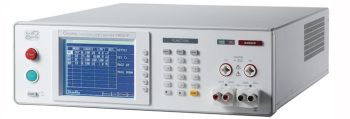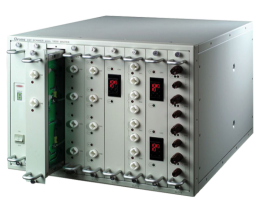Electrical Safety /
Ground Bond Testers
Ground bond testers are specialized electrical testing instruments used to verify the quality and safety of electrical ground connections in various applications, including manufacturing, production, and maintenance environments. These testers ensure that electrical equipment is properly grounded, preventing hazards to operators and damage to equipment. The purpose of a ground bond test is to measure the resistance of an electrical ground connection. The resistance should be low to safely conduct electrical current to the ground. A typical ground bond tester consists of a power supply, a current meter, and test leads with clamps or probes for attaching to the ground connection being tested. To perform a ground bond test, connect the test leads to the ground connection and apply a test current. The instrument measures the voltage drop across the connection and calculates the resistance using Ohm's law. If the measured resistance is within an acceptable range, the connection is considered safe and functional. Ground bond testers are critical tools for ensuring the safety and reliability of electrical equipment. They also help diagnose and troubleshoot electrical problems, ensure compliance with regulatory standards, and meet industry requirements. Different ground bond testers are available on the market, from handheld devices to advanced automated systems. Some testers can perform other electrical tests, such as insulation resistance and continuity tests. The selection of a ground bond tester depends on the specific needs, requirements, budget, and available resources for the application.
Ground bond testers are specialized electrical testing instruments used to verify the quality and safety of electrical ground connections in various applications, including manufacturing, production, and maintenance environments. These testers…
...ensure that electrical equipment is properly grounded, preventing hazards to operators and damage to equipment.
The purpose of a ground bond test is to measure the resistance of an electrical ground connection. The resistance should be low to safely conduct electrical current to the ground. A typical ground bond tester consists of a power supply, a current meter, and test leads with clamps or probes for attaching to the ground connection being tested.
To perform a ground bond test, connect the test leads to the ground connection and apply a test current. The instrument measures the voltage drop across the connection and calculates the resistance using Ohm’s law. If the measured resistance is within an acceptable range, the connection is considered safe and functional.
Ground bond testers are critical tools for ensuring the safety and reliability of electrical equipment. They also help diagnose and troubleshoot electrical problems, ensure compliance with regulatory standards, and meet industry requirements.
Different ground bond testers are available on the market, from handheld devices to advanced automated systems. Some testers can perform other electrical tests, such as insulation resistance and continuity tests. The selection of a ground bond tester depends on the specific needs, requirements, budget, and available resources for the application.
-
The Chroma 19572 ground bond tester is an instrument dedicated to measuring the grounding resistance within the range of 0.1-510mΩ. Its compact and...FIND OUT MORE
-
FUNCTIONS Supports electrical safety tests and function test scanning : – AC/DC WV Test, – IR Test – GB Test, LC Test (all...FIND OUT MORE
-
The latest safety standards for medical equipment are very strict and because the medical equipment is in constant use by medical staff for patient...FIND OUT MORE
-
The Chroma 19032 /19032-P is a 5 in 1 Production Safety Analyzer. It can perform AC/DC Hipot, insulation resistance, grounding resistance and dynamic...FIND OUT MORE
-
The Chroma 19200 can perform high / low voltage switch and scan all safety tests by EST Analyser (Chroma 19032) inputs such as withstanding test;...FIND OUT MORE





